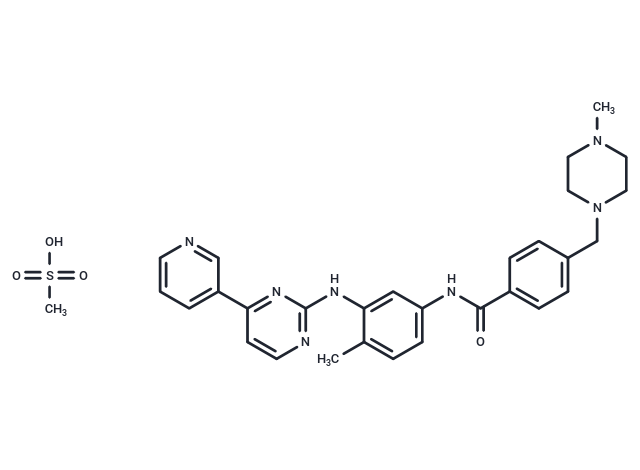Shopping Cart
- Remove All
 Your shopping cart is currently empty
Your shopping cart is currently empty

Imatinib Mesylate (STI-571) is a tyrosine kinase receptor inhibitor with antineoplastic activity (IC50s: 0.6 μM, 0.1 μM and 0.1 μM for v-Abl, c-Kit and PDGFR, respectively).

| Pack Size | Price | Availability | Quantity |
|---|---|---|---|
| 200 mg | $54 | In Stock | |
| 500 mg | $82 | In Stock | |
| 1 mL x 10 mM (in DMSO) | $50 | In Stock |
| Description | Imatinib Mesylate (STI-571) is a tyrosine kinase receptor inhibitor with antineoplastic activity (IC50s: 0.6 μM, 0.1 μM and 0.1 μM for v-Abl, c-Kit and PDGFR, respectively). |
| Targets&IC50 | c-Kit:0.1 μM, PDGFR:0.3 μM |
| In vitro | Inhibition of Steel factor (SLF)-induced c-kit autophosphorylation by STI 571 was dose-dependent, with complete inhibition observed at both 10 and 1.0 μmol/L. Inhibition was also apparent at a dose of 0.5 μmol/L, although limited c-kit autophosphorylation still occurred. Complete inhibition of MAP kinase activation occurred at 10- and 1.0-μmol/L concentrations of STI 571. Partial inhibition was observed at a dose of 0.1 μmol/L, and no inhibition occurred at a dose of 0.01 μmol/L. Total MAP kinase expression was not altered by treatment with STI 571 [1]. Exposure of cells to 1 μM STI571 for 24 hours before lysis resulted in a reduction of cellular tyrosine phosphorylation in general and of TEL/ARG specifically [2]. Imatinib had a more similar effect on Bcr/Abl- and c-Kit–dependent proliferation, with an IC50 of 19 nM in R10(-) cells and 82 nM in MO7e cells growing in the presence of SCF (KL, Kit ligand), respectively [3]. |
| In vivo | The treatment of imatinib significantly reduced the incidence of adenocarcinomas (47.1% vs. 76.9% of untreated TRAMP mice) but had no effect against NE tumors, which instead significantly increased in frequency (23.5% vs. 15.4% of untreated TRAMP mice) [4]. In the imatinib group, lung function was improved with a lower W/D ratio. Perivascular edema and neutrophil infiltration were ameliorated. The imatinib group demonstrated maintained expression of VEC, inhibition of pCrkL, and a significantly higher level of interleukin (IL)-10 [5]. |
| Cell Research | Cells were added to 96-well plates at a density of 20?000 cells/well for HMC-1 and 50?000 cells/well for M-07e. Experiments with M-07e were performed with the use of GM-CSF or SLF as a growth factor supplement. Experiments using HMC-1 were performed without growth factor supplementation. Proliferation at 48 hours was measured with an XTT-based assay [1]. |
| Animal Research | Heterozygous experimental TRAMP mice were obtained by breeding wild-type C57BL/6 male mice and heterozygous female TRAMP mice. MC-deficient C57BL/6-KitW-sh/W-sh mice were intercrossed over 12 generations with TRAMP mice to obtain MC-deficient KitWsh-TRAMP mice. Cromolyn (10 mg/kg dissolved in saline; Sigma Aldrich) or imatinib (50 mg/kg dissolved in saline) were administered intraperitoneally in TRAMP mice for 5 days/week. Treatments started at 8 or 16 weeks, as indicated in text and figures, and continued for the duration of the experiment. Mice were sacrificed at 25 weeks and their urogenital apparatus collected for IHC [4]. |
| Alias | STI-571, ST-1571 Mesylate, CGP-57148B |
| Molecular Weight | 589.71 |
| Formula | C29H31N7O·CH4SO3 |
| Cas No. | 220127-57-1 |
| Smiles | CS(O)(=O)=O.CN1CCN(Cc2ccc(cc2)C(=O)Nc2ccc(C)c(Nc3nccc(n3)-c3cccnc3)c2)CC1 |
| Relative Density. | 0.858 g/mL at 25 °C(lit.) |
| Storage | Powder: -20°C for 3 years | In solvent: -80°C for 1 year | Shipping with blue ice. | ||||||||||||||||||||||||||||||||||||||||
| Solubility Information | H2O: 59 mg/mL (100.05 mM), Sonication is recommended. DMSO: 50 mg/mL (84.79 mM), Sonication is recommended. | ||||||||||||||||||||||||||||||||||||||||
Solution Preparation Table | |||||||||||||||||||||||||||||||||||||||||
DMSO/H2O
H2O
| |||||||||||||||||||||||||||||||||||||||||

Copyright © 2015-2025 TargetMol Chemicals Inc. All Rights Reserved.